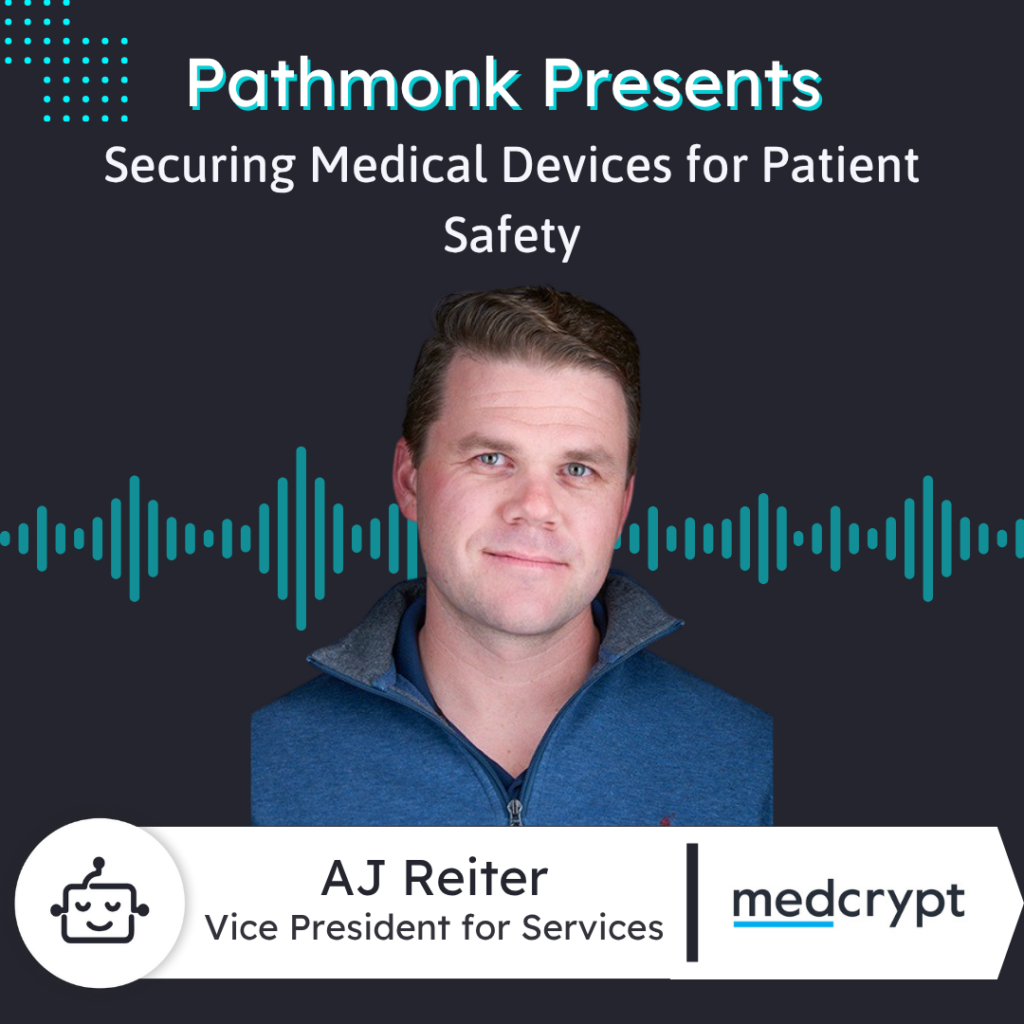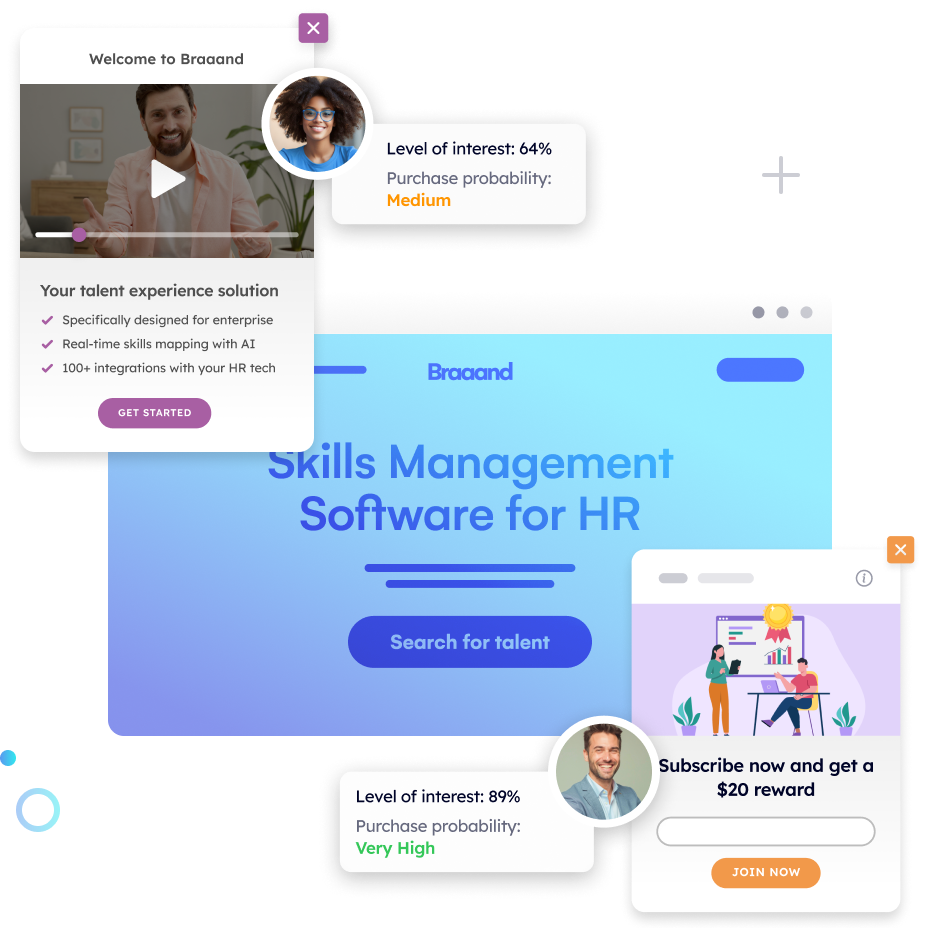
Introduction
AJ Reiter, Growth Director at Medcrypt, joins Pathmonk Presents to discuss their mission to secure medical devices for patient safety.
Medcrypt provides cybersecurity solutions for top medical device manufacturers, focusing on surgical robotics and diabetes devices, ensuring FDA compliance and secure data transit.
Reiter emphasizes the role of their website in guiding customer conversations and the importance of face-to-face engagements at industry events. Learn how Medcrypt’s proactive approach and thought leadership help manufacturers expedite market entry while prioritizing patient safety and data integrity.
Increase +180% conversions from your website with AI
Get more conversions from your existing traffic by delivering personalized experiences in real time.
- Adapt your website to each visitor’s intent automatically
- Increase conversions without redesigns or dev work
- Turn anonymous traffic into revenue at scale

Rick: Pathmonk is the AI for website conversions. With increasing online competition, over 98% of website visitors don’t convert. The ability to successfully show your value proposition and support visitors in the buying journey separates you from the competition online. Pathmonk qualifies and converts leads on your website by figuring out where they are in the buying journey and influencing them in key decision moments with relevant micro-experiences like case studies, intro videos, and much more.
Stay relevant to your visitors and increase conversions by 50% by adding Pathmonk to your website in seconds. Let the AI do all the work and increase conversions while you keep doing marketing as usual. Check us out on Pathmonk.com.
Hey everybody, welcome to today’s episode of Pathmonk Presents. Today we’re joined by AJ Reiter. He’s the Growth Director at MedCrypt. AJ, welcome to the show.
AJ Reiter: Thank you, excited to be here.
Rick: Excited to have you, AJ. Let’s go to the basics right away. Can you tell us a little bit about MedCrypt? In your own words, what’s the heart of what your company does, and how would you describe it to someone new?
AJ Reiter: Absolutely. MedCrypt is a medical device startup focused on providing cybersecurity for medical devices—securing the data transit and decision-making that large, medium, and small manufacturers incorporate into their device design.
We work pretty closely with pretty much everyone in the top 10 MDMs, as well as startups across different device types, but primarily within the surgical area and the diabetes space.
Rick: Very interesting. You mentioned the type of businesses you work with. Can you touch a little more on that—maybe the industries you serve best? And what’s the core problem you solve for them? Why do they come to you?
AJ Reiter: Our core industry is medical devices—it’s right in the name with MedCrypt. We help customers meet global regulatory expectations from the FDA, the EU, and other bodies worldwide.
But we also care deeply about patient safety. We work to ensure devices are secure, making it more difficult to hack or spoof data, and giving practitioners, doctors, and surgeons more peace of mind when making decisions based on connected devices.
Ultimately, it’s about helping customers get to market securely, protecting data, and supporting the end practitioner—which is really the mission for most people in the medical device space.
Rick: And we’re all about security here at Pathmonk too, so it’s an important topic for everyone. Even more so in the medical space. I’m sure there are a lot of companies out there in need of that.
AJ, can you tell us how your audience typically finds you? What are your top acquisition channels?
AJ Reiter: The med device cybersecurity space is quite small. We have strong relationships across the industry because many of our employees are former FDA reviewers or policy writers.
Our industry experts spend a lot of time meeting customers at events around the world—we’re attending more than one a month at this point. Our marketing team also works hard to ensure that when someone searches for medical device cybersecurity online, our site shows up first.
So I’d say most of our opportunities come from warm relationships, referrals, or recommendations. But we also do some cold outreach to expand.
Rick: That’s really cool. I like the emphasis on face-to-face interactions. You mentioned traveling and visiting customers—shaking hands is underestimated these days, but it’s so important.
That tees me up for my next question: the website. How crucial is your website when it comes to attracting clients?
AJ Reiter: I’d say it’s critical. Our website is set up to help us engage in initial conversations with customers and answer a number of questions that help us tailor discussions.
Even if someone reaches out through another channel, we typically guide them through our website because we have ingestion points and qualifying questions that let us bring in the right team members and assess urgency.
It’s also where we update content regularly—biweekly, at this point—based on regulatory changes like new FDA expectations. So it’s definitely central.
Rick: Makes sense. The old saying was “your website is your business card,” but now it’s much more than that. Still, it acts as that touchpoint people can go to if they want to know more or get in touch.
AJ Reiter: Exactly. It’s critical, and we’re consistently revamping it with new material to reflect industry changes.
Rick: Now I want to switch gears and talk about you as a leader. As Growth Director, what does a typical day look like? What do you focus on?
AJ Reiter: My role is to make sure all the trains run on time, so to speak. I oversee all delivery across customers, manage relationships, and help transition new customers into steady-state management.
I also identify and propose delivery methodologies for customers to expedite their time to value. Day-to-day, I’m usually checking in with existing customers, talking to new ones, doing thought leadership, and working on new product development—incorporating customer feedback to improve MedCrypt’s products overall.
Rick: That’s interesting. Being close to product development is valuable in your position. Do you find it helps with client relationships?
AJ Reiter: Absolutely. Voice of the customer is the most important input. Too often, companies develop what they think customers need without considering what they actually want.
We work to balance needs and wants, making sure customers feel heard in feature development. Staying tuned into product development is one of the most important aspects of my job.
Rick: That makes a lot of sense. AJ, we’re coming towards the end of our time. Let’s jump into the rapid-fire segment: quick, sharp questions where concise questions get concise answers. Are you ready?
AJ Reiter: Sounds good. Works for me.
Rick: Do you prefer watching, reading, or listening?
AJ Reiter: Reading.
Rick: What’s the latest piece of content you’ve read? Could be a book or article. Any gems that stuck with you?
AJ Reiter: The most recent book I read was SPQR, about the early to mid-days of the Roman Empire. I try to read 50 pages a day to keep the mind sharp.
What I love about SPQR is that it pokes holes in our perception of Rome as a flawless archetype of perfection. It reminds us they were just people like us—even if they were responsible for some of history’s most impressive inventions and advances. That perspective has dominated some of my recent discussions.
Rick: Interesting. I’ll ask you a couple things offline—I’m into that topic too. And yes, that meme about men thinking about the Roman Empire several times a day… it’s real.
AJ Reiter: Too real! I went deep into the Old West recently and finished a hefty series there, so now I’m rewinding history a bit further.
Rick: Very good. Quick question: if there were no limits with technology, what’s one thing you’d love it to solve to make your life easier as a Growth Director?
AJ Reiter: I’d love to automate early-stage mockups. Customers often say, “It’d be great if your product did X—what would that look like?” Reducing the time to prototype would be huge.
It would help me proactively show customers not just our current offerings but also what we’re capable of. Beyond that, I’d like people to know we don’t just do what’s on our site—we can help with anything cybersecurity- or software-related in the medical device space. Educating the market more efficiently would help a lot.
Rick: Very good. What’s one repetitive task you’d love to put on autopilot forever?
AJ Reiter: Outreach. Most of our customer acquisition comes from warm leads or referrals, but cold outreach is something I’d love to “set and forget.”
We also run weekly thought leadership webinars with partners and industry experts. Automating outreach and communication around those would help us educate the space more consistently—because our mission is about improving the industry’s understanding, not just selling.
Rick: Makes sense—it’s about education, making it easier to show value once you’re in front of people.
AJ, thank you for being on the show today. If someone forgets everything, what’s the one thing they should remember about MedCrypt?
AJ Reiter: MedCrypt focuses on patient safety first. Our mission is to ensure devices are safe so doctors can make effective decisions with reliable data.
If your device requires practitioner input—whether surgical tasks or dosage—we can help with best practices and security recommendations. Patient safety is always our top priority.
Rick: Awesome. And if people want to reach out, where should they go?
AJ Reiter: Our website, medcrypt.co, is the best landing page. You can also find us on LinkedIn, Twitter, and BlueSky. We partner with 50+ conferences a year, so ideally you’re seeing our material if you’re in the space. Worst case, email info@medcrypt.co—that’ll reach our whole team quickly.
Rick: Amazing. AJ, thank you again for being with us today. Hopefully we can do this again soon.
AJ Reiter: Sounds great. Life is moving fast for me personally too, but I’m excited to stay connected.
Rick: All right. Bye everyone.



